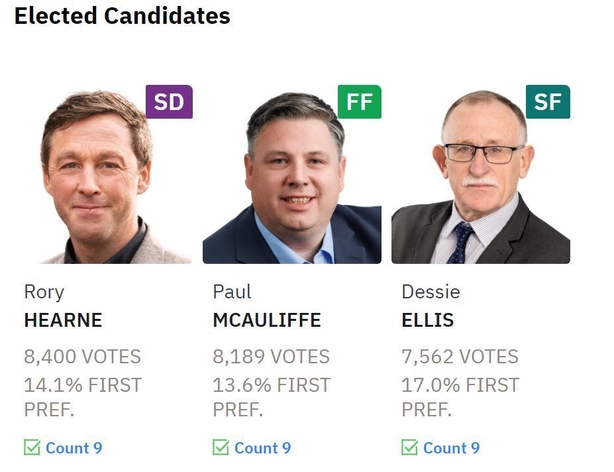How it started ...

After a count that lasted over two days, the end result for Dublin North-West is that everything remains the same.
As the dust of the General Election settles, the constituency continues to be represented by one Sinn Féin, one Social Democrat, and one Fianna Fáil.
Two sitting TDs, Sinn Féin's Dessie Ellis and Fianna Fáil's Paul McAuliffe, retained their seats, and the Social Democrats managed to hold on to theirs too, with Rory Hearne successfully retaining the seat vacated by Róisín Shortall.
This was always going to be a challenge and the party managed it.
Mr Hearne may have a considerable public profile as a commentator and writer on housing but he does not live in the constituency and had no particular personal roots there.
Sinn Féin too faced a challenge, one they set for themselves.
The last time round, in 2020, Dessie Ellis running alone topped the poll with 44% of the first preference vote.
This time he was joined by a running mate, Cathleen Carney Boud. But the party's bid to bring home two TDs was not to be, and its share of the vote fell to 31%.
Fine Gael had set itself a challenge too. Could Noel Rock take back the seat that Mr McAuliffe had "taken from him" in 2020? But they didn't pull this off.
As the count progressed Mr McAuliffe spoke to RTÉ News of two "pools" of votes in the constituency, with the Fianna Fáil and Fine Gael votes in one, and sure enough he benefited most strongly from Mr Rock's transfers when they came.
But what about the other "pool", the one that once gave 44% of the first preference share to Sinn Féin?
Where did that 12% of first preference votes lost to Sinn Féin this time go?
First preference votes for Independents - and the main independent was right wing candidate Gavin Pepper - rose by 5.4% to 7% of first preferences overall.
The People Before Profit first preference share, with Conor Reddy as their candidate, rose by 5% to 9% of all first preferences. Aontú's vote share rose too.
The Fianna Fáil and Fine Gael share remained static, at 13.6% and 12%, respectively.
A three-seater constituency is always going to be tough for challengers. This election has seen some change to voting patterns in Dublin North-West, but not enough to upset the overall picture.
How it ended ...








